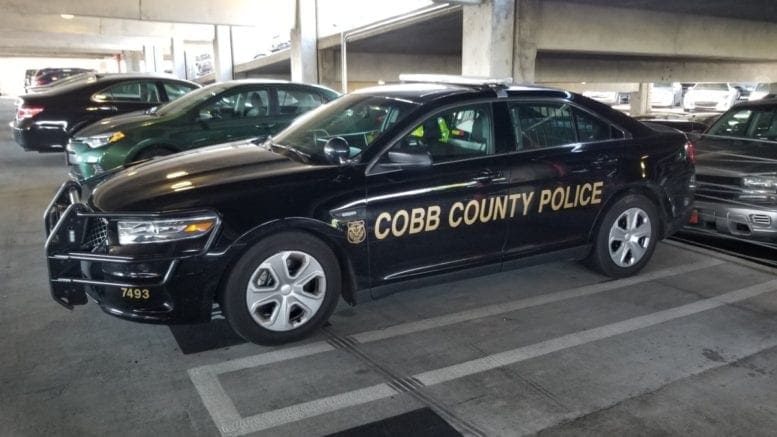[This is a guest opinion by Richard Solomon. Solomon grew up in Cobb County next to Walton High School, and graduated from Indiana University in 2019 with a B.S. in International Studies and a B.A. in Near Eastern Languages and Culture.
After graduation, he moved back to Cobb County.
Guest opinions represent the viewpoint of the author, and do not necessarily reflect the views of the Courier]
Truly, the brutal killing of Ahmaud Arbery in Brunswick, GA and George Floyd in Minneapolis shocks the conscience. I’m reminded of a Cobb County cop, caught in 2017 assuring a frazzled white driver, “Remember, we only shoot black people.”
As concerned people, we can write, donate, and even protest in solidarity, but soon the dust will settle. The novelty of our country’s latest murder porn will wear off; prosecuting the implicated officers will mollify a chunk of the public, and the news cycle will move on.
But as voters in Cobb County on June 9th and November 3rd we have a golden opportunity to put police violence on the political agenda, push the commission and Georgia lawmakers to make reform a priority, and prevent the violence of Atlanta and Minneapolis from plaguing our own community in the future. So to Cobb commission chair candidates Mike Boyce, Larry Savage, Ricci Mason, and Lisa Cupid, and to our state government candidates, I ask the following:
1. How will you ensure community oversight over the Marietta, Cobb County and Smyrna Police Departments? No one wants multiple complaints to go ignored until an officer does something horrific. Simply letting internal police commissions decide what, if any, consequences their peers face sets up a system ripe for abuse of power. In Atlanta, the however-imperfect Citizen Review Board holds city officers accountable. Cobb candidates could establish a similar civilian complaints office, give them funding and subpoena power, and make it easy for citizens to report misconduct.
2. Do you plan to roll-back police militarization? Recent violence in Atlanta and Minneapolis vividly illustrates how departments can misuse military weaponry to intimidate, escalate, and repress, instead of keeping people safe. As Mark Twain remarked, “To a man with a hammer, everything looks like a nail.” Indeed, studies show that militarized police departments are much more likely to kill civilians. Under the 1033 program, Cobb County police procured around $215,000 worth of military equipment from the federal government. Marietta police procured $77,676, and the Atlanta police department almost $1 million. Candidates should pledge transparent oversight over department procurements and restrict police from buying and using weaponry such as drones, grenade launchers, and weaponized aircraft.
3. Do you support amending or abolishing Georgia’s Citizen’s Arrest law? Arbery’s killers in their legal defense resorted to this antiquated statute, which was originally added to the Georgia Code in 1863 to let whites catch runaway slaves. The law nowadays allows citizens to arrest each other and is supposed to let retailers detain shoplifters. In reality it encourages vigilantism and leads to unnecessary confrontations. In the “call 9-1-1” era, where police reach the scene within minutes, it’s dangerous to let citizens take the law into their own hands. At least, lawmakers can amend the statute to apply only to violent felonies, not misdemeanors. Georgia NAACP has raised this issue before; we should, too.
4. How do you intend to limit use of force? A few weeks ago a sheriff’s deputy in Claxton, GA shot and killed Yassin Mohamed. The victim was allegedly suffering from a mental health crisis and had thrown rocks at the officer. Instead of responding with bullets, imagine if social workers and medics handled a broader portfolio of 911 calls – homelessness, substance abuse, domestic violence, mental health emergencies. We should invest in these programs, like Dallas has done. Make Cobb County police carry less-lethal weapons, like Seattle’s PD policy. Ban chokeholds, strangleholds, and hog-ties like the NYPD.
5. How will you ensure transparency and accountability in police policy? Civil unrest happens in part because of mass disillusionment with institutional mechanisms of change. “A riot is the language of the unheard,” Martin Luther King said. Therefore, allow ample opportunity for public comment on police policy changes. Invite civil society, religious leaders, and victim advocates to testify at county commission and state house meetings. Field periodic surveys to the community on police performance. Preserve disciplinary files of past misconduct and make them available under the Georgia Open Records Act. Communicate to what extent the police represent the demographic diversity and gender balance of the community they serve. If they don’t represent us, prioritize representation in hiring. Diversity isn’t trivial; evidence shows that departments with more black officers tend to kill fewer black people.
These reforms are the tip of the iceberg. From expanding public access to in-car and body camera footage to ending for-profit policing such as civil forfeiture, Cobb Commission candidates and Georgia lawmakers can show bold leadership, compassion, and wise governance. As private citizens, Georgia Innocence Project, Atlanta Victim Assistance and the Georgia NAACP offer us ways to engage and organize in a long-term, informed way – beyond purely reactive forms of activism and protest.
In his impassioned address this past week, the Atlanta rapper Killer Mike pleaded, “I’m tired of seeing black men die.” The line struck me. I hope our elected leaders in Cobb County earnestly help end this scourge. If not, we must vote them out of power.


Thank you for putting in writing my concerns.
My name is Saladine Cureton and I was assaulted October 9th 2020 by Cobb County Police Officer Pancotti. During the assault my knee was broken and I never went to jail just had major surgery and sent home on pain meds. Furthermore the system in Cobb County is corrupt and appear to get sick thrills out of killing and assaulting Black Men. This is not 1821 it’s 2021 and they treating us worse than slavery it’s open genocide.